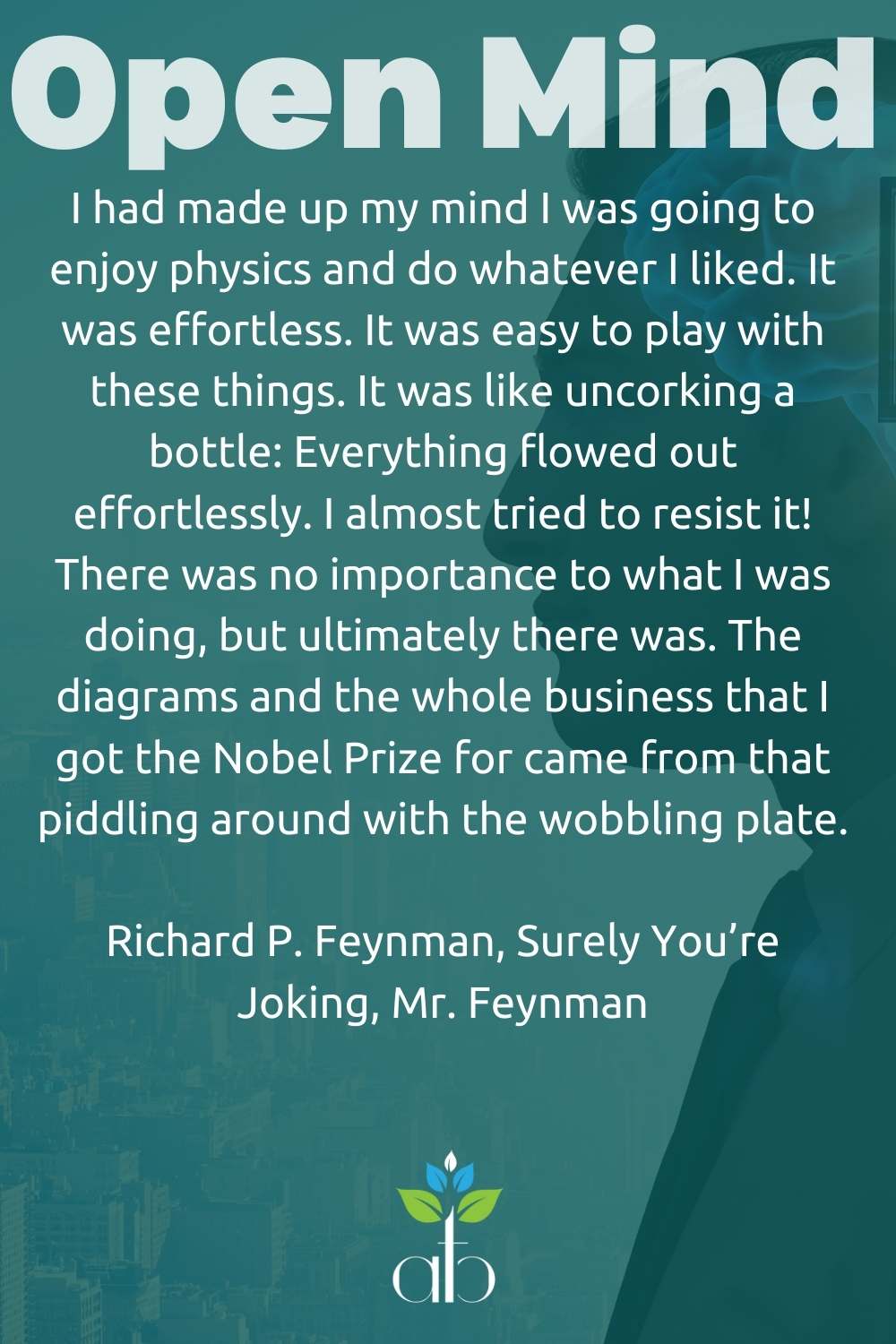Episode 381
Ask Questions

People will often give lip service to the idea of being open-minded, saying “I’m all for having an open mind, but not so open that my brain falls out.” Normally this means that a person is willing to consider new ideas, up to the point where some strong bias or prejudice kicks in.
Really, we cannot know if a new idea is absurd until we have considered it. If we refuse to consider it, we must be resigning ourselves to the limits of our previous conceptions, or misconceptions.
Exploring ideas can be confronting, even a little scary. However, the alternative is to maintain our prejudices, slowly hardening and moving in the walls that keep us from truly understanding the world.
The good news is, there are many tools that can aid us in our quest, such as logic, lateral thinking, the “six thinking hats”, and the idea of serious play.
Transcript
This is a beautiful thought, this is how your life is already wonderful.
I was thinking about some things, I was thinking about the idea of asking questions, having an open mind. Being prepared to investigate new ideas you might not have heard before.
Some people will play lip service to the idea of having an open mind but then you find they have a point. They say something like “I am all for having an open mind and exploring ideas but..” And they will normally deliver a thought depleting cliche like but not so open that your brain falls out.
That’s not really a rule that you can apply, how are you meant to know at what point your brain falls out, at what point an idea becomes absurd if you’re not willing to explore and entertain the idea.
The only way you can know if an idea is really absurd or just appears absurd is if you go into it, if you put on that hat and say what is really going on with this idea? Is there any evidence to support it?
Or we put on our 6 thinking hats from Edward de Bono
and start to think, what is the positive aspect? What is the negative aspect? What are the facts around this?
These kinds of things so we can actually really consider an idea, ask those questions. I find myself sometimes going through these rabbit holes. My friend Bob Lunn shared this information with me. Also Andrew Howard previous guest on the podcast shared the idea of the mud flood or the Tartarian Empire.
I’m still not really sure how credible these ideas are. There are aspects that make me go, hmm, that doesn’t make a lot of sense. Like they share these drawings or paintings of Australia just a couple years after the first fleet landed in Australia.
They have built these grand edifices, or in the years after settled by the English there are these Catherdrals and I start to ask, how did that get there? The idea of the Tartarian Empire is kind of fantastic idea that the entire world was settled by this previous empire, coming out of Central Asia. They had this advanced technology and flew around the world in Zeppelin’s, I don’t know if that’s true but its interesting.
I don’t have to know if its true because its still food for thought for me. Its a creative exercise because I can fertilize my brain with this and later use it in a different way which might not be factual or literal.
This is something else Edward de Bono talks about, a “po”, a propositional idea. An idea which doesn’t have to be factually correct or even literally possible, an idea that can provide a stepping stone to bring us to something practical.
When we are willing to explore ideas, even ones that are bizarre or absurd, even ones which many people will reject, like the idea of a flat earth. People will take that and say “where does this go?” And you might end up writing a novel like the disk world novels of Terry Pratchett where the disk world is suspended on the back of an elephant. Under the elephant is a giant turtle that travels through the cosmos.
Maybe its useful for that.
Or if you are interested in making computer games, maybe the idea of a flat earth comes in that context where you can make a simplified mathematical model for simulating the earth. Who knows where this goes? I don’t really know where an idea is going to go.
I bring up the example of Richard Feynman, he was in the Cafeteria, I think he was teaching at Cal Tech. And he was provided tenure there at the time. He would see these plates spinning in the air, like he’d see someone drop a plate and wonder if he could calculate the spin on that.
He didn’t necessarily know where the idea was going to lead but he was fascinated about it. He just liked ideas. Its this passion for ideas that does provide the innovation eventually. If it doesn’t lead to innovation that is fine as well. We are in this world of ideas, there is this intellectual world and we can play in it and have fun in it.
Of course we do need to be careful, I mentioned the thought terminating cliches but I guess the steal man or the best case would be well surely you waste a lot of time exploring these ideas if you aren’t going to apply something. That’s the strongest case but I don’t buy that because I don’t think exploring ideas is a waste of time.
I think its fun. I think its valuable to play. Play is wonderful and play is how we can actually give some of the finest moments, these moments that don’t result in a particular action but they might provide that fertile ground for action later. Just be valuable of themselves because they are enjoyable, because they allow us that majestic freedom to explore our own minds.
The other thing that people say is what happens, you are willing to entertain an idea because the educated mind is willing to entertain an idea?
But what happens if you get lost? I think its actually a valuable criticism. My brother said to me once “you are interested in this flat earth, you are entertaining the idea but what happens if you end up being an anti semite? Im presenting an absurd version, but what he said has some validity.
Not just a slippery slope argument, there are cases where people get these ideas and go towards hateful ideologies, that does happen. Not just inventing that, that is something that goes on.
What my brother didn’t know is I have had many years of exploring these ideas. I know my way around the jungle. But not everyone does know their way around the jungle and some get lost in the jungle of ideas. It is important to have mentors or people around us that we can bounce ideas off of. People who are willing to be critical of our ideas.
I think as it says in proverbs just as iron sharpens iron, one friends countenance sharpens another. If we have some critical friends, some friends willing to tell us you know I do have some doubt about that idea. Im not sure if that’s right.
Also friends who will agree with us when we do seek the truth or look for the truth in or behind what we are saying. There is something to that, maybe they say but. What’s the other side?
That’s something very valuable when we are asking questions.
What’s the other thing?
Ah yes learning about logic I took a course in logic at Newcastle university many years ago. I think that served me a lot in developing my own view of the world. Being able to have the humility to subject our own ideas to critical analysis, to logical analysis. To examine if they do follow logically when making arguments.
And also apply that to other people’s ideas. Not always easy to do, of course we always have our own biases. Its important to be conscious of our own thoughts. Sounds silly, sounds like I am being redundant.
But no this is vital just to think whatever we choose to think, whatever our whims give us to think but to be aware of our own thoughts and know which direction we are going.
And of course do that one thing which can make all the difference, which can bring us into us into an examined life, a life so holy worth living to ask questions.

New Episodes Every Weekday
11am Mexico City time
10 min episodes Monday - Thursday
1 h interview episode on Fridays
As an Amazon Associate I earn from qualifying purchases.
Stay Beautiful &
Stay Connected
